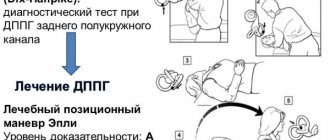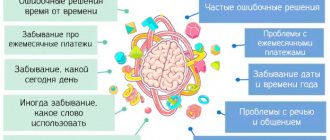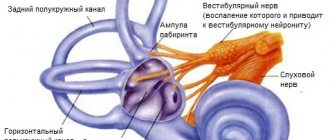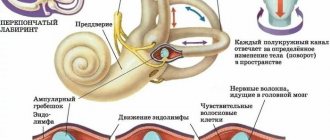What is behind such malfunctions in the body as dizziness and nausea - physiology or psychosomatics ?
Nausea and dizziness are common symptoms of a large number of diseases and pathologies. First of all, these are characteristic signs of poisoning, infections, gastrointestinal diseases, concussions, and emotional shocks. Even such a wonderful state of a woman as pregnancy is often also accompanied by regular nausea and dizziness. You should not ignore these signals from your own body. It is necessary to consult a specialist and undergo a comprehensive health examination. But what to do in a situation where the body’s indicators are normal, no pathologies have been detected, and nausea and dizziness do not go away?
A good option is to attend the free webinar by Konstantin Dovlatov “How to turn life crises into resources.”
On it you will receive a lot of information about how psychosomatics manifests itself and how to treat it.
Psychosomatics, a science that studies and tracks the influence of stress and negative emotions on the formation of physical illnesses, can help in this situation. After all, the realities of our time are such that it has already been scientifically proven that more than 85% of diseases have metaphysical roots. For a deeper and more accurate understanding of the hidden sources of these pathologies, it is necessary to take into account the opinion of world-famous authors in the field of research into the psychosomatics of diseases.
Interpretation of nausea in psychosomatics from famous experts
After conducting a large number of observations, the famous author Louise Hay came to the conclusion that the following thoughts and feelings could be possible sources of these disorders. She recommends using positive statements - affirmations - to eliminate them (see table):
| Pathology of the body | Possible sources | Positive Attitudes |
| Dizziness | Fleeting, incoherent thoughts. Reluctance to see. | I am calm and purposeful in life, I can live completely calmly and rejoice. |
| Nausea | Fear. Rejection of an idea or experience. | I am protected and trust the path of life, which brings me only positivity. |
You can learn about other diseases whose symptoms are these conditions from this table: https://dovlatovcoach.ru/promo/luiza-hej-tablitsa-boleznej/ The author of books on popular psychology, Vladimir Zhikarentsev, explains these pathologies with such psychosomatic roots (see table):
| Pathological conditions, injuries | Probable Causes | Positive Attitudes |
| Nausea | Fear. Denying a thought or experience . | I'm safe. I trust the process of life, which will only benefit me |
| Dizziness | The escape. Scattered, disordered thinking. Refusal to look around you. | I concentrate on life and am at peace with it. It is safe for me to live and enjoy life. |
To combat the invisible causes of these disorders in the body, the author recommends repeated repetition of the above positive attitudes. The famous doctor Luule Viilma states: the feeling of anxiety that nothing will work out can provoke nausea, according to psychosomatics. But the emergence of dizziness is facilitated by the abandonment of one’s spiritual needs in sacrifice to the whims and desires of others. You can learn about the psychosomatics of other pathologies from the point of view of this author from this article: https://www.dowlatow.ru/zdorove/psihosomatika/psihologicheskie-prichiny-boleznej-luule-viilma/
If simple affirmations do not give a lasting result, the issue may be in generic scenarios.
Find out what to do with them at the free webinar by Konstantin Dovlatov “How to stop walking in circles of generic scenarios and take life into your own hands.”
Psychosomatics expert from Canada Liz Burbo, in her work “Your body says: “Love yourself,” sees the metaphysical cause of nausea in the victim’s feeling of threat due to some event or person. This provokes disgust in the patient, as it contradicts his plans. Answering the question of how to get rid of nausea and the psychosomatics of the pathological condition, the expert advises the patient to change his attitude towards what is happening in his life. Analyze and ask yourself why a person or thing causes me fear and disgust. Perhaps the person is overly dramatizing the situation and perceives what is happening to him biasedly. Liz Burbo also recommends that the victim try to love himself for who he is. A similar psychosomatics in dizziness is an attempt to avoid something that sprinkles salt on an unhealed mental wound; absent-minded, reckless actions of the patient.
Bibliography:
1. Filatova E. G. Diagnosis and treatment of psychogenic dizziness // Attending physician. –2009. - No. 5/9. — https://www.lvrach.ru/2009/05/9155798/ (Access date: 07/18/2016).
2. Drapkina O.M., Chaparkina S.M., Ivashkin V.T. Dizziness in the practice of an internist // Cardiovascular therapy and prevention. – 2007. – No. 6 (4). – pp. 107-114.
3. Zamergrad M.V. Vestibular vertigo // Neurology, neuropsychiatry, psychosomatics. – 2009. – No. 1. – P. 14-18.
4. Sitdikova A.I. et al. Psychogenic dizziness: clinical features and diagnostic principles // Bulletin of modern clinical medicine. – 2015. – T.8. — No. 6. – pp. 76-79.
5. Filatova E. G. Anxiety in neurological practice // Lech. nervous bol. – 2005. – No. 1. – P. 7–14.
6. Melnikov A. N., Stanko E. P. Panic attacks in children and adolescents // Journal of the Grodno State Medical University. – 2005. – No. 3 (11). – pp. 33-35.
7. Golubev V.L., Vein A.M. Neurological syndromes. – M.: Eidos Media, 2002. – 832 p. – pp. 695–704.
Therapeutic exercise to improve the functioning of the cardiovascular system.
How to get rid of nausea using folk remedies?
- Pre-prepare a vodka infusion of citrus peels . Pour two or three tablespoons of crushed orange or lemon peels into half a liter of vodka. Let it brew for a week. Take as a solution of thirty drops of infusion in one hundred milliliters of water before meals.
- a tablespoon of crushed peppermint with a glass of boiling water. Let it brew for a day. Drink half a glass of infusion before meals, twice a day.
- For nausea due to mild food poisoning, drink lemon juice diluted with filtered water.
Worsened nausea and dizziness, based on the findings of researchers of the psychosomatics of diseases, are directly related to the negative state of the victim’s psyche and the stress he has experienced. But does it make sense to react to stress and emotional negativity with dizziness and nausea? When chronic dizziness and nausea are driving you crazy, don't despair. Using the methods of “ Spiritual Integration ”, you get a real chance to get rid of the sources and consequences of these pathologies.
Treatment of psychogenic dizziness
Many doctors deal with the problem of dizziness, but when treating psychogenic dizziness, consultations with a neurologist and psychotherapist are especially important.
Typically, complex therapy is used to treat psychogenic dizziness, which includes both medicinal (including antidepressants) and non-medicinal treatment methods. [5] Of great importance are:
• vestibular gymnastics, which is aimed at training and reducing the excitability of the vestibular apparatus; [7]
• breathing exercises, which help reduce hyperventilation (its manifestations include lack of air, dissatisfaction with inhalation, inability to take a full breath, etc.);
• psychotherapy.
It has long been proven that a person’s psychological health is as important as physiological health. [4] Keep this in mind and be sure to consult a specialist if you feel dizzy.
Psychological types of people susceptible to psychosomatic headaches
Psychologists have found that a person’s character and temperament are related to the intensity and characteristics of the disease. In choleric and sanguine people, discomfort occurs in the upper part of the head and in the temples, in melancholic people - on the back of the head, in phlegmatic people, discomfort moves to the nose-forehead area. Now let's look at how a person's character is reflected in the specifics of pain.
Arrogant Personalities
Arrogant people are characterized by inflated self-esteem, inadequate demands and expectations for other people, a tendency to judge everyone down, overestimate themselves and underestimate others. They often say with a dissatisfied look, “You give me a headache.”
People with low self-esteem
The complete opposite is that a person is critical and strict with himself. He is constrained and tense, trying to please everyone.
Too emotional people
If a person has increased emotionality, then even the habit of expressing all his emotions will not help. Such people take everything to heart, are easily irritated, easily charmed and disappointed. They have poor self-control. Excessive emotionality can be both a feature of temperament and a sign of pathology.
Perfectionists
An impossible number of obligations, unrealistic plans and expectations, the desire to do everything perfectly and control everything - all this drains the brain. The perfectionist's brain works at its limit; it never rests.
Causes of psychosomatic headaches
Cephalgia is associated with stress, fatigue and internal worries. External and internal, physical and psychological factors contribute. Let's take a closer look at the popular factors that cause cephalalgia.
Too much or too little sleep
Both deficiency and excess sleep disrupt the healthy hormonal balance in the body. Melatonin suppresses stress hormones. If a person does not get enough sleep, he becomes irritable, and if he sleeps too much, he becomes lethargic and apathetic. Both have a negative impact on productivity, relationships in the family and at work.
Recent stress
After resolving a long-term conflict or after a strong emotional shock, a dull, aching, pressing pain may occur. This is a consequence of pressure surges and hormones.
Mental and physical fatigue
Occurs in 80% of cases. The discomfort is not severe, but constant. Which leads to nervousness and irritation.
Depression
Depression and any other disorder are prolonged stress. Cephalgia is a natural and integral companion.
Suppressed emotions
Unexpressed emotions and feelings (both positive and negative) turn into toxins that negatively impact your physical and mental health.
Fear
The heart rate increases, blood pressure rises, self-control weakens - what a stressful situation. Constant fear can turn into panic attacks, which are accompanied by a feeling of suffocation, headaches and dizziness.
Dissatisfaction with others and life
Resentment, anger, irritation, anger, and the desire for revenge accumulate and turn into toxins that clog blood vessels and cause cephalalgia.
Two types of development of psychosomatic headaches
There are several types of nervous headaches:
- Hypertensive. Occurs due to increased blood pressure as a result of overexertion. Feels like a pressing, encircling pain, sensitive to stress and weather changes. It is more pronounced in the morning.
- Hypotonic. Occurs due to a decrease in blood pressure. Sensitive to weather changes and emotional shocks. It manifests itself as pressing pain in the back of the head, accompanied by dizziness (psychosomatics says that dizziness corresponds to the phrase “the head is spinning from problems”).
- Vegetative-vascular. Occurs due to weakness and spasm of blood vessels.
- Inflammatory. Accompanies a cold. Covers the entire head, accompanied by body aches.
- Spasmodic. It occurs due to the fact that muscle tone increases and they compress the blood vessels. This happens with neuroses and chronic stress.
- Hormonal. It is more common in women before menstruation, during menopause, pregnancy and in other situations in which hormonal levels change (due to the specifics of the pituitary gland).
- Migraine. It occurs on one side and affects the temporal zone, forehead, neck, and eye. The pain is very strong. Accompanied by increased sensitivity to external stimuli.
This is interesting! Migraines occur 3–5 times more often in women than in men.
According to the specifics of development, cephalalgia is of two types: due to external factors and due to internal factors. Let's take a closer look at them.
External factors
The main external factor is stress (reaction to external stimuli). At this time, the muscles tense, the body prepares for defense. The digestive and urinary systems slow down, but the circulatory system works more actively. Blood pressure rises and adrenaline is produced. This is what causes cephalalgia.
The perception of stress is subjective, so it is impossible to say which situation and for which person will become critical. Examples of negative external factors:
- accidents;
- illness;
- accidents;
- conflicts at home and at work;
- unloved job;
- disturbing news;
- death of someone close;
- divorce;
- dismissal.
This is interesting! Cephalgia is one of the most common symptoms; 90% of patients complain of it. It can accompany hundreds of types of illnesses or be a side effect of taking medications. Therefore, it is recommended to undergo a full diagnosis.
Internal factors
Internal factors are closely related to external ones. We are talking about suppressed emotions, unspoken thoughts, unmet desires and needs. Internal discontent, contradictions, pangs of conscience, psychological trauma, resentment, guilt, complexes, inability to defend one’s opinion - all this turns into muscle blocks that compress blood vessels and nerves. Example: a woman does not want intimacy with her husband, but cannot say directly. Then she takes a detour and subconsciously provokes cephalalgia.
In addition, cephalalgia can occur against the background of neuroses and mental disorders. For example, anxiety, depression, phobias.









